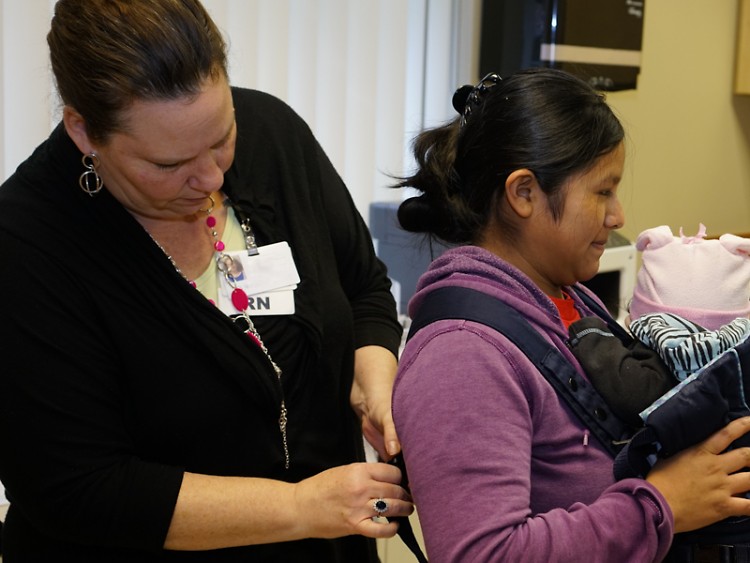It’s a busy Tuesday morning at a community health center on Grand Rapids’ southwest side. The hallways are crowded and staff is scurrying in every direction. Spanish is heard everywhere. You might guess by the number of obviously pregnant women that this is “OB day," the day when obstetricians from obstetrics offices team up with family physicians at the Clinica Santa Maria to provide prenatal care to women who are mostly immigrants from Latin America.
On the surface, it seems like any other busy Tuesday morning. But under the surface, there is a wave of anxiety washing through the community. During the past week word filtered through the community that the Trump administration had announced plans that could affect most of our patients. It could cause some to be targeted for deportation, derail others’ applications for citizenship, or endanger others with anti-immigrant reaction.
The Washington Post published details of the President’s draft resolution on immigration policy on January 23. It has been longstanding policy of the U.S. government to “deny an individual entry to the United States — or reject an immigrant’s request for permanent residence — if there is evidence that the individual is likely to become primarily dependent on government benefits for his or her subsistence."
The draft resolution changes the game to deny entry or to focus deportation orders on anyone who has accepted any form of government assistance during their time in the U.S. This could include many forms of assistance that were encouraged or applied for by charitable agencies. For example, if the immigrant were admitted to a hospital emergently, the hospital would likely push the patient to apply for Emergency Medicaid in order to recover some of the costs of the hospitalization. The same thing would occur if a woman went to a hospital in labor. It’s long been accepted that providing basic medical support to immigrants would avoid much more expensive medical disasters, thus making care more cost effective. A woman receiving relatively low cost prenatal care in a community health center is a much lower cost than taking care of a very sick premature baby in a Neonatal ICU.
As word of the change leaked out into the local Latino media, patients showed signs of distress at the clinic. Our clinic offers charitable care to persons without ability to pay. The charitable care is offered as a part of our mission to help the poor and is not a part of a government program. However, applications for our private financial assistance decreased abruptly last week as rumors emerged. Our financial counselors received frantic calls to cancel both the private charitable assistance and Emergency Medicaid, if present. Even a pregnant woman under our prenatal care asked to have her Medicaid revoked. She would rather face birth with no insurance and no prenatal care, than take the risk of deportation. This sudden rush of decisions to opt out of care has raised great concerns among staff who worry that patients’ health will suffer.
Meanwhile, back at the clinic, I continue to address patient concerns. A young mother brings in her six-month-old baby for a respiratory infection. The baby’s three sisters sit jammed together in the one exam room bench seat, all neatly dressed with bows in their hair. After examining the baby I’m glad to let her know it’s a simple cold and we will give her a nasal bulb syringe, saline drops and some acetaminophen.
Next, a woman who has been working heavy hours in a factory here to check up on chronic pain she developed while lifting heavy boxes 54 hours a week in a local factory. After nine years of doing this work she is developing chronic pain. Without any insurance or Medicaid, I am not able to send her to physical therapy, but can at least explain the problem, provide some medication, and issue work restrictions that her employer may decide to respect.
Another woman comes in for a rash on her arms. She works in a greenhouse where chemical sprays are causing an eruption on her arms. We can’t find out what the chemical is but educate her on how to protect herself and prescribe a steroid cream.
As I get a small break between patients I sit and wonder, will patients stop seeking medical care because they are afraid to come to the clinic? Will they suffer silently in their homes? Will they choose to give birth at home with no medical attention? Will they prefer to buy unproven remedies at the local neighborhood store?
We often marvel at how resourceful our patients are, surviving on low wages, fitting more than one family into a single apartment, and saving money to send back home. But even their tenuous survival is now at risk, and we in the medical community have to consider new ways we can support our patients, and how we can shape immigration policy that will allow them to live their dreams and stay healthy.
The Rapidian, a program of the 501(c)3 nonprofit Community Media Center, relies on the community’s support to help cover the cost of training reporters and publishing content.
We need your help.
If each of our readers and content creators who values this community platform help support its creation and maintenance, The Rapidian can continue to educate and facilitate a conversation around issues for years to come.
Please support The Rapidian and make a contribution today.

